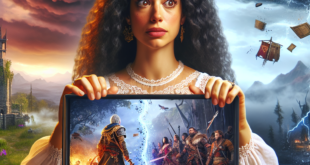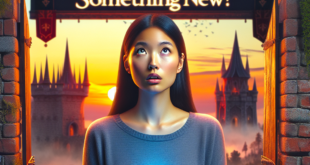
Ella Balinska, voice actress of Frey in Forspoken, has seen the discourse surrounding the game and, unlike her character who would probably tell some of y’all to fuck off, she’s very gracious. In my interview with her, she told me she understands gamers are a passionate lot and that she appreciates that about them. “I love the gaming community for how committed they are to really getting in depth for each game that they play,” Balinska said over Zoom.
She also understands that folks’ reaction to Frey — sometimes calling her mean and shitty — stems from the fact that Frey isn’t like other video game protagonists. “This is such an extraordinary game that has come out with this amazing protagonist who’s so bold, so unapologetic, so reluctant in the best way possible,” she said. “I think audiences might not be so used to seeing that.”
In Forspoken, Frey is a rough-and-tumble orphan from the mean streets of New York City who gets sucked into Athia, a magical world that immediately tries to kill her. Detractors of the game have pointed out some of the things Frey says, like, “Is that a motherfucking dragon?” or, “I just moved shit with my mind,” come across as cringe. Balinska chalked that up to the quirks of humanity.
“There are things that we all do that might be eyebrow-raising to other people.”
So is it cringe? Maybe. But humanity is itself cringe. And video game dialogue in particular has always had an air of cringe. (Paging Hi-Fi Rush.) But Forspoken for some reason seems to be getting an inordinate amount of attention for something that mostly gets tuned out.
I think it’s deeply funny in an ironic way that some players are responding to Frey’s unabashed assertiveness by calling her an unlikeable bitch.
It’s a song and dance very familiar to me. In real life or fake, a Black woman’s behavior is given this level of scrutiny that just doesn’t exist for other people and characters. The Last of Us’ Ellie is just as vulgar and acerbic, but she has no shortage of people willing to die for her. Wonder what the difference is there?
So is it cringe? Maybe. But humanity is itself cringe
In fact, a lot of Forspoken’s plot — despite the fact that apparently no Black people wrote it — touched on very specific Black issues that deeply resonated with me and resolved them, at least somewhat, in a very satisfying way. Forspoken is a Black game. It doesn’t seem like it, and I don’t think Square Enix is trying to market it like that. But unintentional or not, there are elements to its plot, reinforced by Balinska’s phenomenal acting, that made me go “holy shit, this is Black as hell.”
Image: Square Enix / Luminous Productions
To examine Forspoken’s Blackness, we have to start with Frey. I asked Balinska, beyond people’s projections and assumptions about the character, what her vision was for Frey. “Forspoken’s tagline is ‘Find your fight’,” she said. “What I wanted to bring to [Frey] is that she finds her own fight in terms of her voice and things that she wants to fight for and stand up for.”
Balinska said she was invested in bringing Frey’s journey of self discovery to life, and it works really well in the game. Forspoken’s has this typical “heroine is sent to a magical and dangerous world they don’t understand and is the only one with the power to save it” premise. It feels like most protagonists in this situation accept their fate with a kind of passivity because that’s the engine that drives the story. But Frey vehemently rejects this. She wants to go home.
Whenever there’s a progressive social movement that needs momentum, people on social media are quick to say “Black women will save us.” Black women like Stacey Abrams and others were credited with the huge voter registration drives that turned historically red states like Georgia purple. In South Carolina, Bree Newsome Bass was arrested for climbing a flagpole to take down the Confederate flag hanging above the state’s capital. There’s the now iconic photo of Ieshia Evans at a protest in Louisiana standing her ground against cops in full riot gear, the picture of absolute serenity.
“Black women will save us” is meant to be a positive thing, highlighting our comparatively higher rates of civil engagement, business ownership, and education. But we do the things we do because we have to, because it’s our mechanism for survival. Simply saying “Black women will save us” then becomes a way for people to absolve themselves of any responsibility for enacting the change they wanna see while also being deeply de-humanizing to Black women themselves.
Simply saying “Black women will save us” becomes a way for people to absolve themselves of any responsibility
So in Forspoken, when I see people try to impress upon Frey, “You have to save us,” and she pretty clearly and firmly tells them, “No, I don’t. Leave me the fuck alone,” I cheered. Black women are not your mule, and Frey doesn’t allow herself to be one, and I loved that.
For most of the game, everything Frey does is motivated by her self-interest. That’s not typical isekai protagonist behavior. They’re supposed to be selfless — or at least that’s how the media tends to portray them. Even the more reluctant ones come around and embrace their destiny. Depending on the choice you make at the end of the game, Frey doesn’t.
At the end of the game, Frey realizes that she was born in Athia and was meant to take on the powers and responsibilities of her mother who was a Tanta. Because of plot reasons, Frey’s mother was forced to abandon her in the world of her father, who was apparently some guy from New York. (Why Frey’s magical mother did not drop her daughter off with her father’s people is a question I hope gets answered in a DLC.) Armed with this knowledge of who she is and why her life ended up as it did, Frey is presented with a choice: stay in Athia and fight the big bad or go home.
I swiftly chose the “go home” option and was delighted that not only did the game let you make that choice, but it even gave you a short little epilogue that is, in my opinion, the better ending of the game.
Frey’s being asked to potentially sacrifice her life to save people she doesn’t know. And for what? Because that was a destiny her mother designed for her? If it were me — and in that moment, playing as Frey, it was me — I’d choose “Nah.” So I did, and Frey got to return home to New York, with her favorite knishes and her cat Homer, to get started on that new life and hopefully find her father.
In the other ending, you stay — for a little while, at least — in Athia, no knishes and more importantly no Homer. Objectively, the “return” option is the better end. You get your cat back!
In women, selfishness is verboten. We are stereotyped as selfless caregivers expected to swallow their needs and wants for others. It’s turbo-charged for Black women specifically because of the “Black women will save us” sentiment and the strong Black women stereotype that sentiment reinforces. Forspoken’s choice ending allowed me to exercise a selfishness that isekai stories and my own lived experience rarely permit. I don’t want to be strong, I don’t want to be a savior. I am exhausted! I need salvation and strength for my own damn self!
Forspoken’s ending allowed me to exercise a selfishness that isekai stories and my own lived experience rarely permit
But Ella Balinska is better than me.
“Frey’s basically one of those characters that’s all talk. And I think the second she’s confronted with something real, she realizes what she needs to do. She’s someone who stands up for the people of Athia,” she said. “I know I have the choice to go home, especially with this character. So I think I’d stay and see.”
Image: Square Enix / Luminous Productions
And while I’ve tried very diligently not to pick fights with folks who have a negative opinion of Frey, Balinska doesn’t seem to mind, choosing instead to celebrate the people who enjoy Frey and the game. “I think people always have a positive or negative response to something they’re not used to seeing, and that’s completely okay because that’s the way we incite change,” she said.
Whether or not Forspoken is the success the myriad of people who worked on it hope it is, Balinska already has the metric of success she needs.
“I always reference my eight-year-old self whenever I talk about something I’m really proud of doing, I’m just speechless right now,” she said. “I just never would have thought me playing games downstairs with my mom’s hairdresser’s son while she was getting her hair done. Now, to think that he can pick up this game and play as me, it’s just unbelievable. And I hope it inspires other people to realize that if you commit to the bit hard enough, something really crazy can happen.”
 Latest Breaking News Online News Portal
Latest Breaking News Online News Portal





